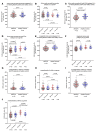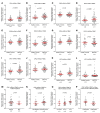Metabolic profiling indicates impaired pyruvate dehydrogenase function in myalgic encephalopathy/chronic fatigue syndrome
- PMID: 28018972
- PMCID: PMC5161229
- DOI: 10.1172/jci.insight.89376
Metabolic profiling indicates impaired pyruvate dehydrogenase function in myalgic encephalopathy/chronic fatigue syndrome
Abstract
Myalgic encephalopathy/chronic fatigue syndrome (ME/CFS) is a debilitating disease of unknown etiology, with hallmark symptoms including postexertional malaise and poor recovery. Metabolic dysfunction is a plausible contributing factor. We hypothesized that changes in serum amino acids may disclose specific defects in energy metabolism in ME/CFS. Analysis in 200 ME/CFS patients and 102 healthy individuals showed a specific reduction of amino acids that fuel oxidative metabolism via the TCA cycle, mainly in female ME/CFS patients. Serum 3-methylhistidine, a marker of endogenous protein catabolism, was significantly increased in male patients. The amino acid pattern suggested functional impairment of pyruvate dehydrogenase (PDH), supported by increased mRNA expression of the inhibitory PDH kinases 1, 2, and 4; sirtuin 4; and PPARδ in peripheral blood mononuclear cells from both sexes. Myoblasts grown in presence of serum from patients with severe ME/CFS showed metabolic adaptations, including increased mitochondrial respiration and excessive lactate secretion. The amino acid changes could not be explained by symptom severity, disease duration, age, BMI, or physical activity level among patients. These findings are in agreement with the clinical disease presentation of ME/CFS, with inadequate ATP generation by oxidative phosphorylation and excessive lactate generation upon exertion.
Conflict of interest statement
Conflict of interest: Haukeland University Hospital has patents and pending patent applications on the issue of B cell depletion therapy for myalgic encephalopathy/chronic fatigue syndrome, a treatment principle mentioned in the discussion of the article. Family members of WO2009083602 A1 are pending and some of them are granted, including US 7.914.785. Øystein Fluge and Olav Mella are named as inventors.
Figures





Comment in
-
Biological underpinnings of chronic fatigue syndrome begin to emerge.Nature. 2017 Mar 28;543(7647):602. doi: 10.1038/543602a. Nature. 2017. PMID: 28358099 No abstract available.
References
-
- Carruthers BM, et al. Myalgic encephalomyelitis/ chronic fatigue syndrome: clinical working case definition, diagnostic and treatment protocols. J Chronic Fatigue Syndr. 2003;11(1):7–36. doi: 10.1300/J092v11n01_02. - DOI
LinkOut - more resources
Full Text Sources
Other Literature Sources

